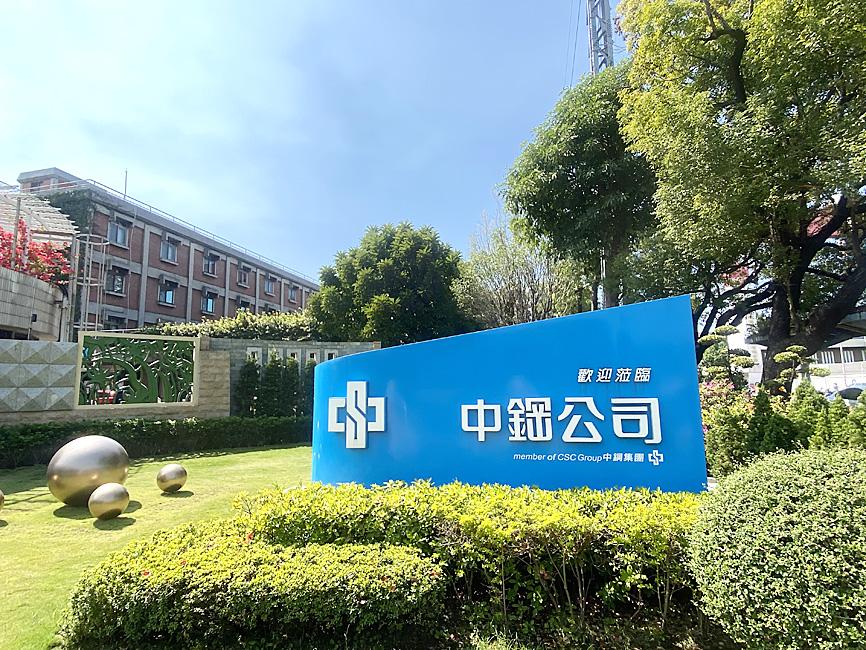China Steel Corp (CSC, 中鋼) plans to impose a moderate carbon surcharge on steel exports in August next year ahead of the implementation of new EU carbon rules, it said yesterday.
A draft version of the EU’s Carbon Border Adjustment Mechanism is to be released in 2023 and implemented in 2026, affecting 248 items including steel, the company said.
Even though only about 3 percent of CSC’s products are exported to Europe, the company is taking the issue seriously and aims to minimize the impact on Taiwan’s steel industry, as the rules would have a more profound effect on downstream companies, it said.

Photo: Hung Chen-hung, Taipei Times
CSC only ships about 330,000 tonnes of steel to Europe each year, but the new regulations could disproportionately affect its downstream customers who have more exposure to the European market, it added.
CSC executive vice president and spokesman Hwang Chien-chih (黃建智) said the company is looking to impose a carbon surcharge in August next year, but details of the scheme, including how much the surcharge would be, have not yet been finalized.
“The first challenge is to actually calculate the carbon footprint of all our products,” Huang said.
Other major economies such as the US and China are also expected to soon adopt their own carbon pricing schemes, he said.
“CSC not only has to come up with a carbon pricing scheme, we have to do so in a way that is transparent and recognized worldwide,” Huang said.
The company is looking to Germany’s ThyssenKrupp AG as an example in imposing a carbon surcharge, it said.

Quanta Computer Inc (廣達) chairman Barry Lam (林百里) is expected to share his views about the artificial intelligence (AI) industry’s prospects during his speech at the company’s 37th anniversary ceremony, as AI servers have become a new growth engine for the equipment manufacturing service provider. Lam’s speech is much anticipated, as Quanta has risen as one of the world’s major AI server suppliers. The company reported a 30 percent year-on-year growth in consolidated revenue to NT$1.41 trillion (US$43.35 billion) last year, thanks to fast-growing demand for servers, especially those with AI capabilities. The company told investors in November last year that

Taiwanese suppliers to Taiwan Semiconductor Manufacturing Co. (TSMC, 台積電) are expected to follow the contract chipmaker’s step to invest in the US, but their relocation may be seven to eight years away, Minister of Economic Affairs J.W. Kuo (郭智輝) said yesterday. When asked by opposition Chinese Nationalist Party (KMT) Legislator Niu Hsu-ting (牛煦庭) in the legislature about growing concerns that TSMC’s huge investments in the US will prompt its suppliers to follow suit, Kuo said based on the chipmaker’s current limited production volume, it is unlikely to lead its supply chain to go there for now. “Unless TSMC completes its planned six

Intel Corp has named Tasha Chuang (莊蓓瑜) to lead Intel Taiwan in a bid to reinforce relations between the company and its Taiwanese partners. The appointment of Chuang as general manager for Intel Taiwan takes effect on Thursday, the firm said in a statement yesterday. Chuang is to lead her team in Taiwan to pursue product development and sales growth in an effort to reinforce the company’s ties with its partners and clients, Intel said. Chuang was previously in charge of managing Intel’s ties with leading Taiwanese PC brand Asustek Computer Inc (華碩), which included helping Asustek strengthen its global businesses, the company

Power supply and electronic components maker Delta Electronics Inc (台達電) yesterday said second-quarter revenue is expected to surpass the first quarter, which rose 30 percent year-on-year to NT$118.92 billion (US$3.71 billion). Revenue this quarter is likely to grow, as US clients have front-loaded orders ahead of US President Donald Trump’s planned tariffs on Taiwanese goods, Delta chairman Ping Cheng (鄭平) said at an earnings conference in Taipei, referring to the 90-day pause in tariff implementation Trump announced on April 9. While situations in the third and fourth quarters remain unclear, “We will not halt our long-term deployments and do not plan to